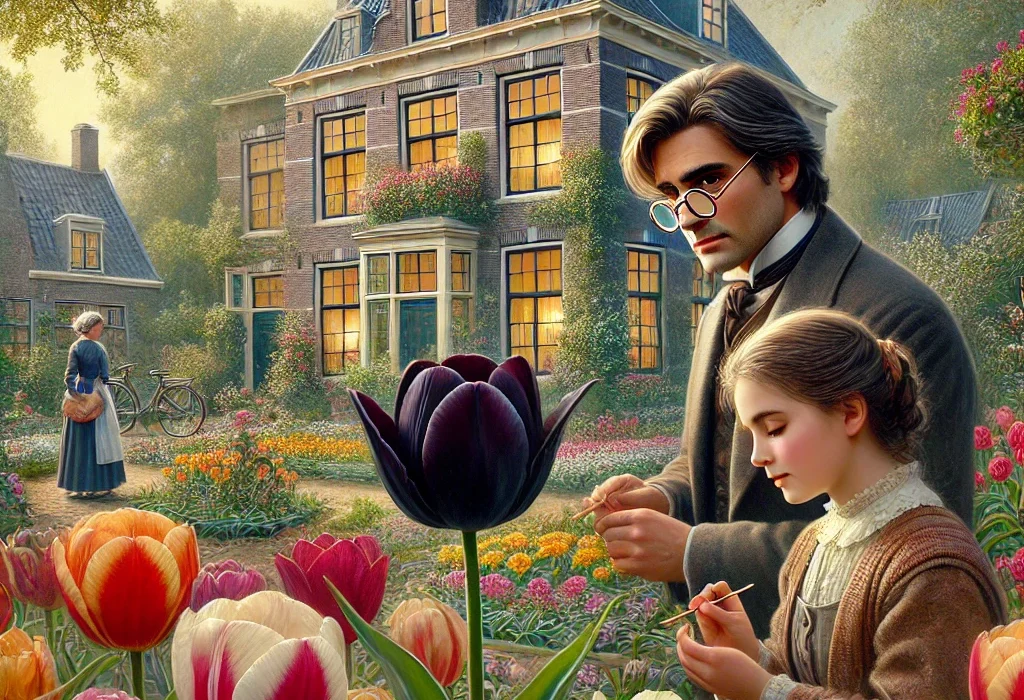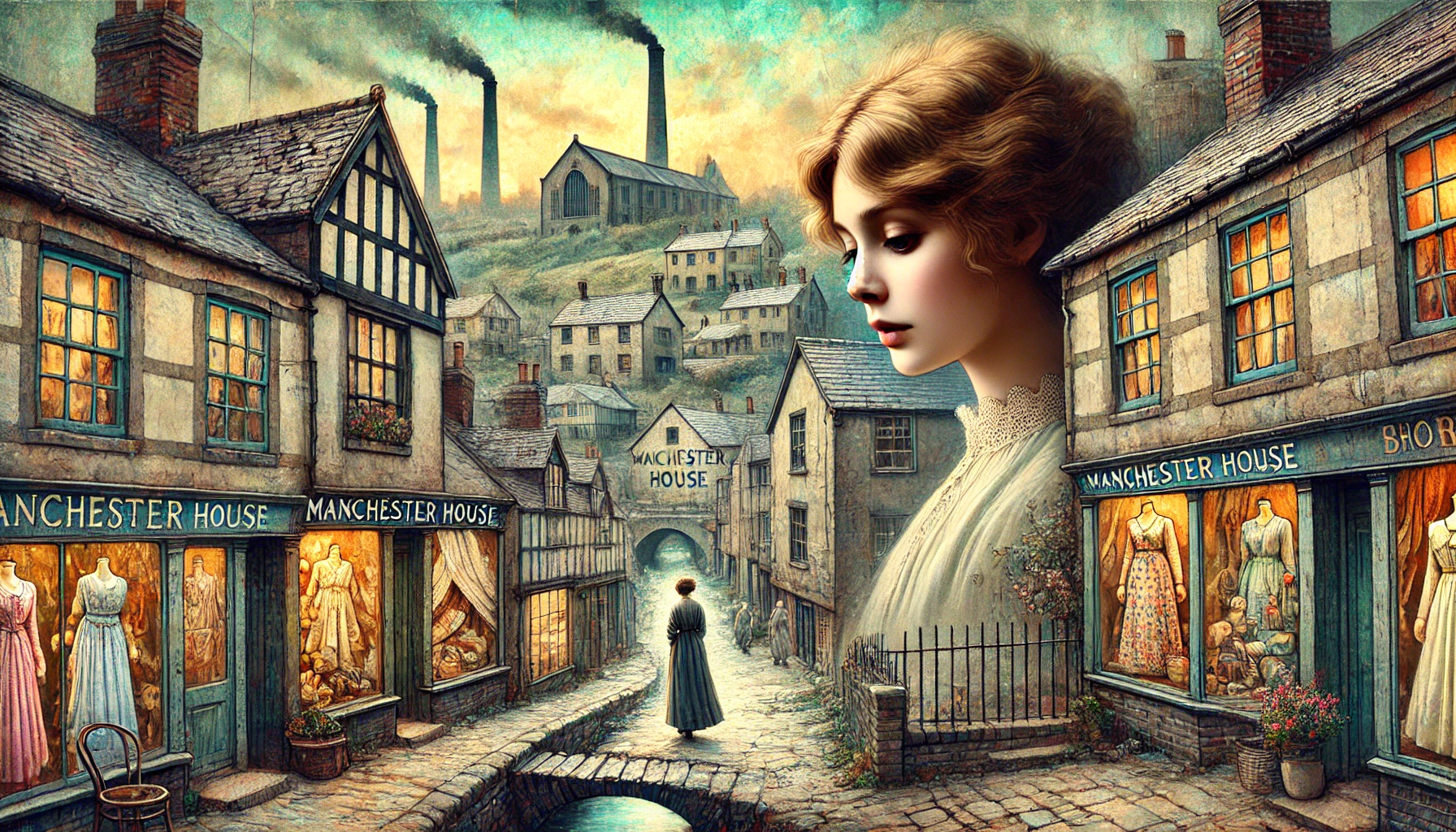The Black Tulip by Alexandre Dumas, published in 1850, tells a historical adventure and romance set in 17th-century Holland. Against the backdrop of political upheaval and the violent execution of the De Witt brothers, Dumas weaves a story about love, resilience, and human ambition, revolving around the quest to cultivate the elusive black tulip. The novel captures the fervor of the time and presents an intense rivalry between tulip growers, reflecting the feverish obsession with rare tulips during the “tulip mania” period in the Netherlands. Through his vibrant characters and rich descriptions, Dumas explores themes of envy, innocence, justice, and love, delivering a tale as captivating as it is poignant.
Plot Summary
On a lively August day in 1672, the city of The Hague teems with unrest. The once-respected De Witt brothers, Johan and Cornelius, have fallen from grace, accused of conspiring against Prince William of Orange. The city square echoes with shouts of anger as the two are brutally executed by a mob driven by political animosity. Amidst this turmoil, their godson, a mild-mannered tulip enthusiast named Cornelius van Baerle, remains unaware of the disaster about to unfold around him.
Cornelius van Baerle lives a comfortable life in Dordrecht, consumed by a single passion: the pursuit of the rare and coveted black tulip. Cornelius is a man of scientific curiosity and gentle spirit, who values beauty above all else, and this unusual tulip represents the pinnacle of horticultural achievement. His meticulous care and dedication have led him to nurture three precious bulbs that he believes hold the key to creating the first true black tulip. But Cornelius’s peaceful life and scholarly pursuits are about to be shattered.
His jealous neighbor, Isaac Boxtel, has watched Cornelius’s achievements with increasing envy. Once a passionate tulip grower himself, Boxtel cannot bear to see Cornelius’s success. Driven by jealousy, he spies on Cornelius, watching his every move through a telescope from his own home. When the opportunity arises, Boxtel seizes it. Learning of Cornelius’s connection to the fallen De Witt brothers, he concocts a scheme to denounce Cornelius as a traitor, claiming Cornelius holds documents that implicate him in a conspiracy against the Prince of Orange.
Soldiers soon come to arrest Cornelius, and in the chaos, he is torn from his home and his precious bulbs. As he is dragged off to prison, his black tulip bulbs are all he can think about, fearing that Boxtel might somehow steal the reward he has worked so hard to achieve. In the bleak walls of the Buytenhof prison, Cornelius meets the prison warden, Gryphus, a man as strict as he is humorless. Gryphus quickly develops a deep dislike for Cornelius, viewing him as an unrepentant enemy of the state. But Cornelius also meets someone unexpected in the prison—Rosa, Gryphus’s beautiful, kind-hearted daughter.
Rosa is different from her father, a young woman of warmth and loyalty. She takes pity on Cornelius, drawn to his gentle nature and tragic plight. Despite her modest background, she recognizes the sincerity in his character, and when Cornelius shares with her his longing to grow the black tulip, Rosa’s sympathy turns into admiration. She agrees to help him, moved by his passion and unwavering hope. Cornelius entrusts Rosa with the care of his precious tulip bulbs, asking her to plant them and tend to them in secret. In the quiet of her room, Rosa carefully places the bulbs in pots, following Cornelius’s instructions to the letter.
Days in the prison are long and filled with sorrow, yet Cornelius’s letters to Rosa, smuggled through secret means, bring them both hope. Rosa, whose heart has grown fond of Cornelius, devotes herself to nurturing the black tulip with an almost reverent care, determined to see Cornelius’s dream come to life. As the months pass, the bulbs begin to grow, a slender green stalk emerging from the soil, a symbol of their shared hope and love. But Boxtel, ever watchful, becomes suspicious when he notices Rosa’s frequent visits to Cornelius’s cell and the growing life in her window.
When the tulip finally blooms, it is a vision unlike any other—a perfect, deep, and true black tulip, the first of its kind. Rosa and Cornelius rejoice, sharing a moment of victory over all that they have endured. Yet this triumph is short-lived. Boxtel, realizing that the black tulip has indeed been cultivated, schemes to claim the tulip for himself. He accuses Rosa of conspiring with Cornelius, manipulating Gryphus’s suspicions to fuel the accusation, and brings his complaint to the Prince of Orange himself.
The Prince summons Rosa and demands she present the tulip in person. Trembling, Rosa travels with the flower that has brought her and Cornelius so much joy, now fearing it may be torn from them. In the Prince’s court, Boxtel, sly and smug, asserts that the tulip is his and that Rosa and Cornelius are nothing more than thieves. But Rosa’s courage shines as she stands before the Prince, defending Cornelius’s innocence and the integrity of their efforts. She explains how Cornelius, even in the darkest days of imprisonment, has worked toward this dream, free of any conspiracy or crime.
The Prince is moved by Rosa’s sincerity, yet skeptical. He demands to hear from Cornelius himself, giving Cornelius a chance to defend his own character and work. Brought to the court, Cornelius explains his sole dedication to the cultivation of the black tulip and declares his innocence in matters of politics. Convinced by Cornelius’s sincerity and Rosa’s heartfelt testimony, the Prince finally acknowledges their honesty. He recognizes Cornelius as the rightful cultivator of the black tulip and condemns Boxtel’s treachery.
In a twist of fate, Boxtel, consumed by his obsession, watches as the very prize he sought so desperately slips through his fingers. The loss is too much to bear, and he collapses, overwhelmed by the weight of his jealousy and the hollowness of his triumph. Cornelius, now vindicated, receives the reward for the black tulip, a prize he once thought would never be his. But far greater than the financial reward is the freedom and the love that await him outside the prison walls.
With the Prince’s blessing, Cornelius and Rosa leave the court as free individuals, their love now deepened by the trials they endured. Rosa, once the daughter of a mere prison warden, is now the companion of a celebrated tulip grower, her life transformed alongside Cornelius’s. Together, they return to Dordrecht, where Cornelius continues his work, creating beauty in a world that had once been so cruel.
The black tulip, a symbol of their shared endurance, blooms every year in their garden, a lasting reminder of hope and love prevailing over betrayal and injustice. In the simple yet profound life they build together, Cornelius and Rosa find not only happiness but a legacy rooted in resilience, love, and the quiet beauty of a perfect black tulip.
Main Characters
Cornelius van Baerle – An innocent and passionate tulip grower from Dordrecht. Gentle and well-educated, he is deeply devoted to the cultivation of tulips, particularly the creation of the legendary black tulip. However, he is falsely accused of treason, a crime for which he is completely unaware, due to his connection with his godfather, Cornelius de Witt. His quiet life is disrupted by betrayal, but his dedication to the black tulip and his love for Rosa sustain him through trials and imprisonment.
Rosa Gryphus – The daughter of the prison warder, Rosa is a young, kind-hearted woman who becomes Cornelius’s confidante and later his love interest. Though her background contrasts with Cornelius’s, her determination and intelligence help her support Cornelius’s quest to grow the black tulip and find justice for his false imprisonment. Rosa’s loyalty and courage provide a strong emotional anchor in the story.
Isaac Boxtel – A jealous neighbor of Cornelius, Boxtel is consumed with envy over Cornelius’s success in tulip cultivation. His obsession drives him to spy on Cornelius and eventually betray him to the authorities. Boxtel’s hatred for Cornelius’s success and happiness leads him down a dark path, reflecting the dangers of unchecked jealousy.
Gryphus – Rosa’s father and the strict, unkind jailer of the prison where Cornelius is held. Gryphus is a harsh man who opposes Rosa’s relationship with Cornelius and distrusts Cornelius himself. His role represents authority and oppression, contrasting with Rosa’s kindness and compassion.
Prince William of Orange – The ruler during this period, William is depicted as a political figure whose decisions affect the fate of many, including the De Witt brothers and indirectly, Cornelius. His actions underscore the political tensions of the time and the impact of authority on the lives of ordinary people.
Theme
The Pursuit of Beauty and Knowledge – The pursuit of the black tulip serves as a symbol of the human quest for perfection and beauty. Cornelius’s dedication to creating something rare and unique underscores the idea that beauty and intellectual achievements are worthy of sacrifice. This theme also explores the obsession inherent in such pursuits and the conflicts that arise from it.
Jealousy and Betrayal – Boxtel’s envy of Cornelius encapsulates the destructive nature of jealousy, showing how it can drive a person to betray others. Dumas uses Boxtel’s actions to illustrate how personal ambition, when tainted by envy, can corrupt relationships and destroy lives.
Injustice and Redemption – Cornelius’s false imprisonment reflects the injustices of the period, with political motives leading to the suffering of innocent people. His character’s resilience and ultimate vindication highlight themes of justice, the pursuit of truth, and the redemptive power of love.
Love and Loyalty – Rosa and Cornelius’s relationship blossoms in the darkest of circumstances, demonstrating that love and loyalty can flourish even in adversity. Rosa’s support and Cornelius’s hope for a future with her sustain them both through their hardships, providing a powerful message of love’s transformative power.
The Power of the Mob and Public Opinion – Dumas portrays the violence and irrationality of mob mentality through the tragic end of the De Witt brothers, influenced by rumors and political machinations. The author critiques how individuals can be powerless before the sway of public opinion, which often lacks justice or mercy.
Writing Style and Tone
Alexandre Dumas’s writing in The Black Tulip combines eloquence, vivid description, and emotional depth. His narrative is rich with historical detail, setting a backdrop that is both immersive and true to the time. Dumas’s prose flows dynamically, capturing the beauty of the tulip gardens, the darkness of the prison cells, and the stark emotions of betrayal, love, and ambition. Dumas’s dialogue is skillfully used to convey the characters’ motivations, whether they are rooted in envy, innocence, or love, giving readers insight into their personalities and struggles.
The tone of the novel is dramatic and reflective, with moments of lightness and humor found in the contrast between Rosa and Cornelius’s budding romance and the grim events surrounding them. Dumas strikes a balance between tragedy and hope, with his typical flair for adventure and romance still present in the unfolding drama. While the tone often leans toward somber reflection on the harshness of political life and human nature, it is ultimately softened by a hopeful outlook through the resilience and dedication of its characters.
We hope this summary has sparked your interest and would appreciate you following Celsius 233 on social media:
There’s a treasure trove of other fascinating book summaries waiting for you. Check out our collection of stories that inspire, thrill, and provoke thought, just like this one by checking out the Book Shelf or the Library
Remember, while our summaries capture the essence, they can never replace the full experience of reading the book. If this summary intrigued you, consider diving into the complete story – buy the book and immerse yourself in the author’s original work.
If you want to request a book summary, click here.
When Saurabh is not working/watching football/reading books/traveling, you can reach him via Twitter/X, LinkedIn, or Threads
Restart reading!








